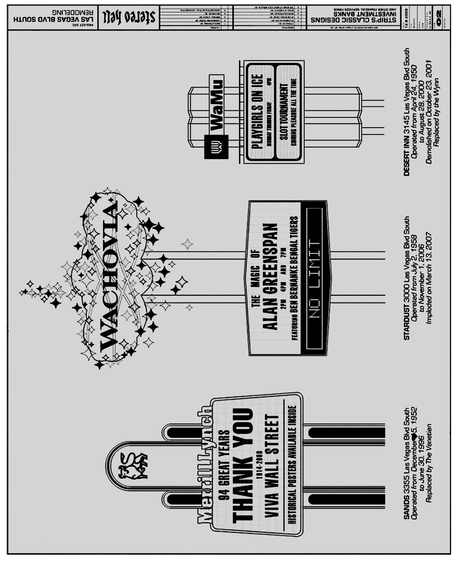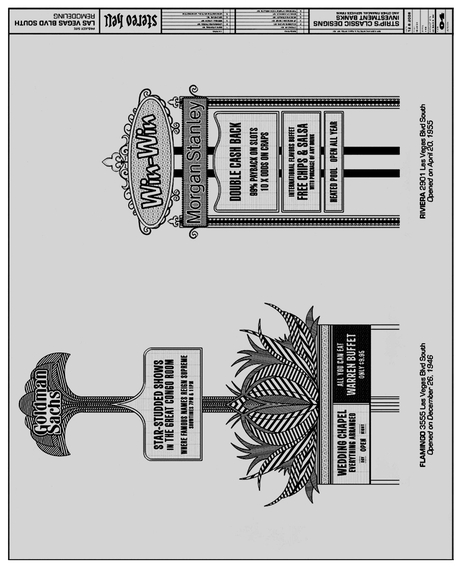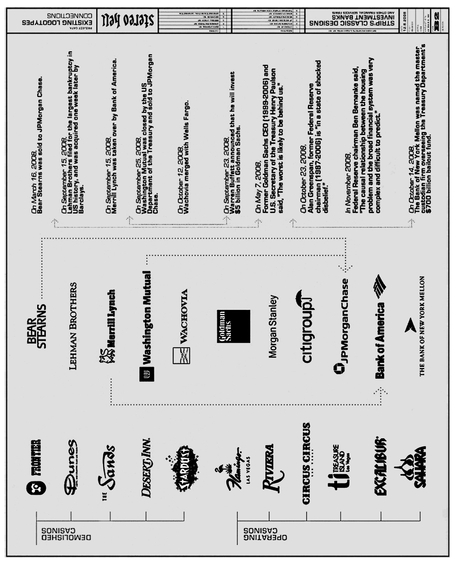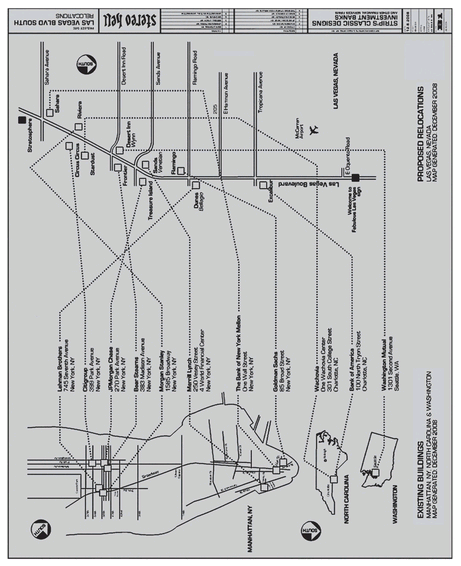Bailout Nation (45 page)
Authors: Barry Ritholtz

Real capitalists nationalize; faux capitalists look for the free lunch.
Source: Strip's classic designs © 2008 Stereohell/JCC

Figure 22.2
Source: Strip's classic designs © 2008 Stereohell/JCC

Figure 22.3
Source: Strip's classic designs © 2008 Stereohell/JCC

Figure 22.4
Source: Strip's classic designs © 2008 Stereohell/JCC

Source: Strip's classic designs © 2008 Stereohell/JCC

Postscript
Advice to a New President
There can be few fields of human endeavor in which history counts for so little as in the world of finance. Past experience, to the extent that it is part of memory at all, is dismissed as the primitive refuge of those who do not have the insight to appreciate the incredible wonders of the present.
âJohn Kenneth Galbraith
Â
Â
I
âve detailed many of my own thoughts throughout the book, but I have two additional ideas. The first is simple: We need to start teaching basic financial literacy in public schools. That so many people willingly signed on the dotted lines for mortgages they could not possibly afford points to the terrible lack of basic financial knowledge.
âve detailed many of my own thoughts throughout the book, but I have two additional ideas. The first is simple: We need to start teaching basic financial literacy in public schools. That so many people willingly signed on the dotted lines for mortgages they could not possibly afford points to the terrible lack of basic financial knowledge.
Second, quantitative methods have become extremely important on Wall Street. Their ability to identify aberrational patterns and find trading opportunities is one of the biggest growth areas in finance today. It is a technique that could be easily adapted by the Securities and Exchange Commission for indentifying fraud. Perhaps the SEC could impanel practitioners, academics, mathematicians, and quants to develop a plan to use the tools of quantitative analysis to ferret out Ponzi schemes such as Bernie Madoff 's before they cause billions in losses and ruin lives.
These past 300 or so pages have criticized, castigated, and even castrated many of the worst citizens of Bailout Nation. For this last chapter, let's employ a different approach.
One of the terrific things about working on Wall Street is that you meet many astute, creative, intelligent people. Contrary to recent events, not everyone who works on the street of dreams is a reckless speculator, overcompensated executive, or Ponzi-schemist. Indeed, the vast majority of Wall Streeters are hardworking souls who are deeply upset about the way their industry has been hijacked and what that has done to our nation. They have many insights about the credit crisis, housing collapse, costly bailouts, and the ugliest recession of our lifetimes. And as you will see, they are not at all shy about expressing their views on how to fix the current mess, either.
Rather than ending our survey of malicious incompetence on a downbeat note, I would like to use this opportunity to present smart ideas from some of the best and brightest I know, offering constructive advice to a new president.
Their suggestions fall into a few broad categories: resolving the housing and credit mess, fixing the economy, improving monetary policy, energy innovations, and (for lack of a better phrase) presidential leadership.

D
oug Kass manages a short hedge fund. (His optimism is such that he recently opened a long-only fund, too!) Doug warned early on that leverage, derivatives, and overvalued stocks were a dangerous combination. Now that his worst-case scenario has come true, he has an intriguing idea. Given that the problem in the housing market is one of excess supply relative to limited demandâtoo many houses, too few buyersâwhy not bring in more home buyers?
oug Kass manages a short hedge fund. (His optimism is such that he recently opened a long-only fund, too!) Doug warned early on that leverage, derivatives, and overvalued stocks were a dangerous combination. Now that his worst-case scenario has come true, he has an intriguing idea. Given that the problem in the housing market is one of excess supply relative to limited demandâtoo many houses, too few buyersâwhy not bring in more home buyers?
Doug writes: “For a long time the United States has had a policy of issuing green cards rapidly to foreigners willing to invest in a business here. If the U.S. had a new policy to issue rapid green cards (with all the usual security checks) to immigrants willing to buy a house or apartment for $200,000 or more and to eliminate overseas earnings from tax for 15 years, we could get a flood of good immigrants, with skills and assets, providing an immediate catalyst in soaking up the surplus of unsold housing inventory. These policies would cost the United States very little, and would bring in directed capital for housing and employment. U.S. residency/citizenship (sans the iniquitous foreign earnings tax policy) would be highly prized and desired among foreigners anxious to live in a stable society with opportunity, compared to the growing instability over much of the world.”
Ed Easterling, president of Crestmont Research, explains why this might work: “The most significant intermediate economic issue is the excess supply of housingâcurrently more homes than qualified home buyers. Since we can't impact the supply of homes in the short run, we need to increase the availability of qualified homeowners. One solution would be to introduce a 10-year work visa program for foreigners who either have college degrees or agree to start a business (and can show that they have the capital to fund it). Both of those groups would be qualified to purchase a full range of excess housing stock and to contribute significantly to the economy.”
And Michael Covel, producer of the documentary film
Broke: The New American Dream
, adds: “Increasing the population somehow or another is the only thing that can fix this mess. We need more people. Give tax breaks and dual passports immediately to those folks who pass an economic means test. Open the borders to money.”
Broke: The New American Dream
, adds: “Increasing the population somehow or another is the only thing that can fix this mess. We need more people. Give tax breaks and dual passports immediately to those folks who pass an economic means test. Open the borders to money.”
Newsletter writer John Mauldin concurs: “Bring in one million fairly affluent, legal immigrants, and you put a floor (and maybe some bounce) in the housing markets at all levels. They will figure out how to work and pay taxes (which we need). Many will start new businesses that will create jobs. With excess housing inventory gone, home building can start again, as well as a lot of related durable goods purchased to furnish those homes. And that is with just one million new immigrants. What if the number were two or three million?”
CNBC host Dylan Ratigan has a novel idea: He wants to update the GI Bill. Ratigan calls for a $50,000 housing tax credit provided to all veterans of the Iraq/Afghanistan wars and to every active member of the U.S. military. The idea is to help both the housing market and the veterans. And he advises, make it tradable. If they don't want to buy a home, they can sell the credit to someone who does. It's more than an effort to prop up the housing marketâit's a benefit for the servicemen and servicewomen in the armed forces.
Asset manager Jim Welsh advises preventing a repeat of mortgage securitization problems. In the future, any institution that originates a loan that will be securitized should be (1) required to keep 10 percent (or some significant percentage) of any loan that is securitized and (2) absorb the first X dollars of loss, rather than the loss going to the investors who purchased the securitized loan. Lenders will be far more attentive to maintaining good lending standards if they are at true risk of loss.
Jim further notes that we have a size problem. The credit crisis has resulted in a major consolidation among our largest financial institutions, with more than half of all nonfinancial debt (debt held by households, nonfinancial companies, and government) held by the top 15 institutions. The SEC, with the aid of Congress and the Federal Deposit Insurance Corporation (FDIC), should mandate that the 20 largest financial institutions be broken up into smaller firms within 10 years. Getting rid of these behemoth firms would go a long way toward preventing another financial meltdown.
Scott Frew runs Rockingham Capital Partners, a long/short hedge fund. He, too, foresaw a credit crisis before most economists and policy makers recognized it. His solution? “Bite the bullet. Recognize the insolvency of these banks, forcing them into receivership at the hands of the FDIC (a much more palatable framing than nationalizing them). Let's start dealing with the consequences sooner rather than later (as Japan did).”
The consequences from this action would be substantial: wiping out equity, preferred shareholders, and the subordinated debt. This action would have major ripple effectsâincluding additional bankruptcies.
Other books
Mira's View by Erin Elliott
Disguise by Hugo Hamilton
Death of an Assassin (Saint Roch City Book 1) by Ian Hiatt
Kiss of Life by Daniel Waters
The Devil in the White City by Erik Larson
A Forest of Wolves by Chelsea Luna
Innocent on Her Wedding Night by Sara Craven
J. Edgar Hoover: The Man and the Secrets by Curt Gentry
The Kallanon Scales by Elaina J Davidson
El manipulador by Frederick Forsyth